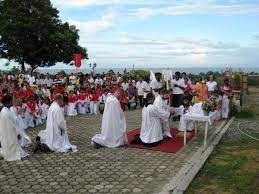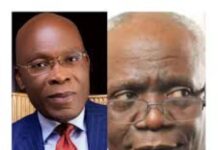Catholics in Nigeria yesterday joined their counterparts in the Christendom to observe the Solemnity of Christ the King ending the Church’s liturgical calendar, with a charge on leaders to emulate the virtues of Jesus Christ especially his humility and servant leadership.
Reverend Father Pius Enekhu of St. Brendan Catholic Church Ijoko Ota, Ogun state who gave the advice in his homily to mark the occasion maintained that Nigeria would attain her development potentials if leaders at the federal, state and local government levels serve with the fear of God and allow Jesus Christ rule over their lives.
According to him, our country and the entire world would be a better place to live in if leaders imbibe such attributes as peace, justice, love, truth and shun evil just as Christ did during his earthly mission.
He said the occasion was of no use to Christians “if we don’t allow Christ rule over us as supreme king of truth, a role model and a good shepherd” unlike the current worldly kings.
The cleric further pointed out that the Scriptures readings taken from the Books of Daniel and Revelation attest to the kingship of Jesus Christ adding that those who are not worshipping him sincerely in truth and spirit should change for the better.
Rev. Enekhu while reflecting on the Gospel reading from John 18, added that both Pontius Pilate and the Jews did not accept the message of truth preached by the Messiah and were carried away by things of the world just like many in the current generation.
He said: “The kingdom of this world will pass away but the kingdom of God will last for ever” stressing that the celebration offered a rare opportunity for Catholics to acknowledge and worship Christ as the Universal King who is open to believers without protocol.
He disclosed that Christ died on the Cross at Calvary for the salvation of mankind explaining that no ruler on earth would do that for his subjects.
Speaking on the origin of the celebration, Fr. Enekhu said it was instituted by Pope
Pius XI as a Feast of Christ the King in 1925, in response to growing nationalism and secularism.
























